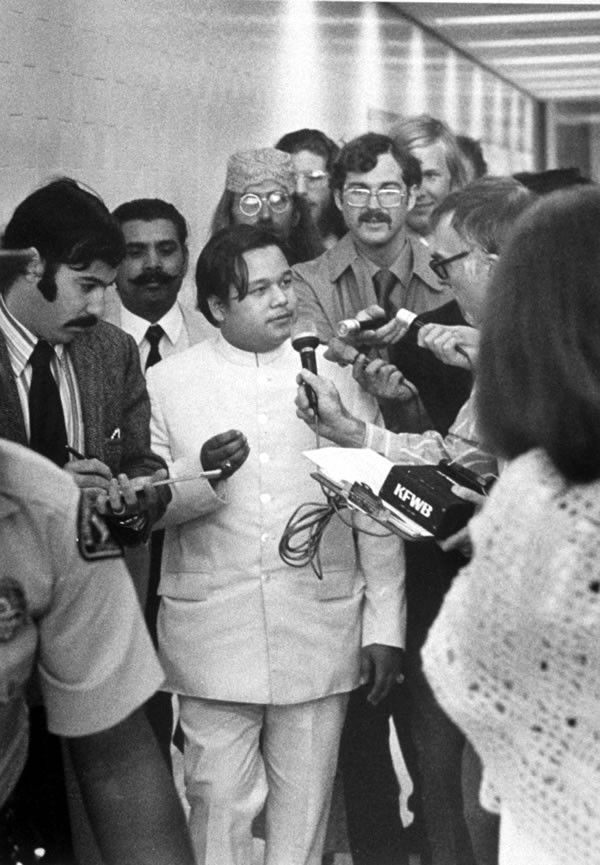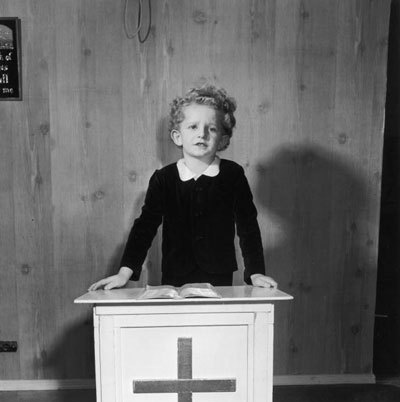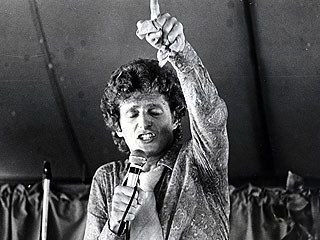Speaking of the former child preacher Marjoe Gortner, he was hired in 1973 by OUI, a middling vagina periodical of the Magazine Age, to write a deservedly mocking article about the American visit of another youthful religious performer, the 16-year-old Maharaj Ji, an adolescent Indian guru who promised to levitate the Houston Astrodome, a plot that never got off the ground. Two excerpts from the resulting report published the following May, which revealed a tech-friendly and futuristic cult leader, who would have been right at home in today’s Silicon Valley.
____________________________
“The guru’s people do the same thing the Pentecostal Church does. They say you can believe in guru Maharaj Ji and that’s fantastic and good, but if you receive light and get it all within, if you become a real devotee-that is the ultimate. In the Pentecostal Church you can be saved from your sins and have Jesus Christ as your Saviour, but the ultimate is the baptism of the Holy Ghost. This is where you get four or five people around and they begin to talk and more or less chant in tongues until sooner or later the person wanting the baptismal experience so much-well, it’s like joining a country club: once you’re in, you’ll be like everyone – else in the club.
The people who’ve been chanting say, ‘Speak it out, speak it out,’ and everything becomes so frenzied that the baptismalee will finally speak a few words in tongues himself, and the people around him say, ‘Oh, you’ve got it.’ And the joy that comes over everybody’s faces! It’s incredible. It’s beautiful. They feel they have got the Holy Spirit like all their friends, and once they’ve got it, it’s forever. It’s quite an experience.
So essentially they’re the same thing pressing on your eyes while your ears are corked, and standing around the altar speaking in tongues. They’re both illuminating experiences. The guru’s path is interesting, though. Once you’ve seen the light and decided you want to join his movement, you give over everything you have–all material possessions. Sometimes you even give your job. Now, depending on what your job is, you may be told to leave it or to stay. If you stay, generally you turn your pay checks over to the Divine Light Mission, and they see that you are housed and clothed and fed. They have their U. S. headquarters in Denver. You don’t have to worry about anything. That’s their hook. They take care of it all. They have houses all over the country for which they supposedly paid cash on the line. First class. Some of them are quite plush. At least Maharaj Ji’s quarters are. Some of the followers live in those houses, too, but in the dormitory-type atmosphere with straw mats for beds. It’s a large operation. It seems to be a lot like the organization Father Divine had back in the Thirties. He did it with the black people at the Peace Mission in Philadelphia. He took care of his people-mostly domestics and other low-wage earners–and put them up in his own hotel with three meals a day.
The guru is much more technologically oriented, though. He spreads a lot of word and keeps tabs on who needs what through a very sophisticated Telex system that reaches out to all the communes or ashrams around the country. He can keep count of who needs how many T-shirts, pairs of socks–stuff like that. And his own people run this system; it’s free labor for the corporation.”
____________________________
“The morning of the third day I was feeling blessed and refreshed, and I was looking forward to the guru’s plans for the Divine City, which was soon going to be built somewhere in the U. S. I wanted to hear what that was all about.
It was unbelievable. The city was to consist of ‘modular units adaptable to any desired shape.’ The structures would have waste-recycling devices so that water could be drunk over and over. They even planned to have toothbrushes with handles you could squeeze to have the proper amount of paste pop up (the crowd was agog at this). There would be a computer in each communal house so that with just a touch of the hand you could check to see if a book you wanted was available, and if it was, it would be hand-messengered to you. A complete modern city of robots. I was thinking: whatever happened to mountains and waterfalls and streams and fresh air? This was going to be a technological, computerized nightmare! It repulsed me. Computer cards to buy essentials at a central storeroom! And no cheating, of course. If you flashed your card for an item you already had, the computer would reject it. The perfect turn-off. The spokesman for this city announced that the blueprints had already been drawn up and actual construction would be the next step. Controlled rain, light, and space. Bubble power! It was all beginning to be very frightening.”
____________________________
“The Houston Astrodome will physically separate itself from the planet which we call Earth and will fly”:



